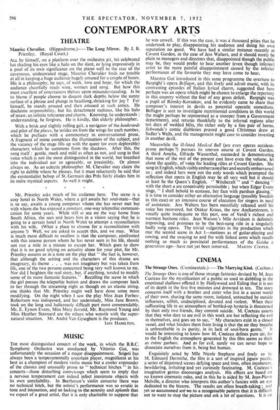MUSIC Tun most distinguished concert of the week, in which
the B.B.C. Symphony Orchestra was conducted by Vittorio Gui, was unfortunately the occasion of a major-disappointment. Szigeti has always been a temperamentally uncertain player, magnificent at his best as a champion of modern violin music but a cooler expounder of the classics and unusually prone to " technical hitches " in his - concerts—those disturbing contretemps which seem to imply that a nervous temperament can indeed infect inanimate objects with its own unreliability. In Beethoven's violin concerto there was no technical hitch, but the soloist's performance was so erratic in tone and intonation, and so lackingin,theaerenity and aplomb that we expect of a great artist, that it is only charitable to suppose that he was unwell. If this was the case, it was a thousand pities that he undertook to play, disappointing his audience and doing his own reputation no good. We have had a similar instance recently at Covent Garden, in the case of-Jess Walters, and it should surely be plain to managers and directors that, disappointed though the public may be, they would prefer to hear another (even though inferior) artist to the more painful disappointment caused by the inferior performance of the favourite they may have come to hear.
Maestro Gui introduced in this same programme the overture to Respighi's opera Belfagor, and this lively anti adroit music, with its contrasting episodes of Italian lyrical charm, suggested that here perhaps was an opera which might be chosen to enlarge the repertory in this country without the fear of any gross deficit. Respighi was a pupil of Rimsky-Korsakov, and he evidently came to share that < composer's interest in devils as potential operatic comedians. Belfagor is sent to investigate matrimonial conditions in this world (he might perhaps be represented as a snooper from a Government department), and returns thankfully to the infernal regions after ten days of wedded bliss, the richer only by a fine pair of horns. Schwanda's comic diableries proved a good Christmas draw at Sadler's Wells, and the management might care to consider investing in another devil.
Meanwhile the ill-fated Masked Ball (are even operas accident- prone perhaps ?) pursues its uneven course at Covent Garden. A third Amelia, Elfriede Wasserthal, succeeded in demonstrating that none of the rest of the present cast have even the volume, let alone the quality, of voice for leading roles at Covent Garden. She sang in English, which visibly.embarrassed her and secretly embarrassed us ; and indeed hers were not the only words which prompted the reflection that opera in English may be all very well but it should at least be the Queen's English. " Witchcraft " and " dancing " with the short a are conceivably permissible ; but when Edgar Evans sings, " I shall behold in ecstasee, her face with parshun glauing," it is time to consider either an alternative language (possibly Swedish in this case) or an intensive course of elocution for singers in need of assistance. Jess Walters has been mercifully released until his voice has recovered, but Otakar Kraus, the new Anckarstroem, is vocally quite inadequate to this part, one of Verdi's richest and warmest baritone roles. Jean Watson's Mlle Arvidson is definitely improving, and promises to be the best-sung role in a singularly badly sung opera. The trivial vulgarities in the production which mar the second scene in Act .I—motions as of guitar-playing and rowing, and the swaying to and fro with linked arms which recalls nothing so much as provincial performances of the Geisha a generation ago—have not yet been removed. MARTIN COOPER.


































 Previous page
Previous page